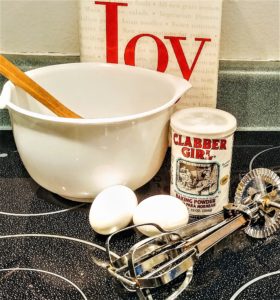 Most Saturday mornings start the same: I ask my husband who will make us pancakes for breakfast. Since the cats are not quite teenagers yet (and do not have opposable thumbs, nor are they tall enough to reach the stove), our options are limited. Sadly, I have yet to perfect making pancakes at high altitude. I never remember if it’s more flour, more milk or less baking powder. I stare at the ingredients on the counter and pore over my cookbooks. Inevitably, we each fix our own bowl of cereal as I return the eggs to the refrigerator.
Most Saturday mornings start the same: I ask my husband who will make us pancakes for breakfast. Since the cats are not quite teenagers yet (and do not have opposable thumbs, nor are they tall enough to reach the stove), our options are limited. Sadly, I have yet to perfect making pancakes at high altitude. I never remember if it’s more flour, more milk or less baking powder. I stare at the ingredients on the counter and pore over my cookbooks. Inevitably, we each fix our own bowl of cereal as I return the eggs to the refrigerator.
Although I like to blame my pancake failures on altitude, that’s not quite the whole truth. Even though my grandmother and I made pancakes at least once a week when I was growing up, I have never gotten the hang of making pancakes by myself. Her recipe was simple enough—it involved Bisquick mix, eggs, milk and melted butter. It was probably even from the back of the box. A quick internet search tells me everything I need to know and then some; I remembered the ingredients if not the proportions. Not only that, but now there are videos for how to make the pancakes if I need extra assistance.
I have been thinking about pancakes for a few reasons, but mostly because I am reminded of their simplicity and deliciousness thanks to Karen Babine’s new book, All the Wild Hungers. One essay from the collection is filled with pancake love. She shares that with the right tools (including a thrift-store aebelskiver cast iron pan) and recipes, it became as easy for her to make pancakes every morning as it was to “pour a bowl of cold cereal.” Her grandfather was dubbed the “pancake king,” supervising everyone’s pancake-making techniques. Her other family members love pancakes as much as she does, requesting them for birthdays, holidays and other family celebrations.
Pancakes became a necessity rather than a luxury after my grandmother watched some local news exposé about the amount of sugar in cereal. I kissed my beloved Cookie Crisp goodbye as my grandmother got back to basics. She spent mornings teaching me how to make scrambled eggs and bacon, oatmeal and, yes, pancakes, to satisfy my sweet tooth.
There were certain tools we used to make the pancakes which, unlike Babine’s, were made on a griddle. The griddle was black and embedded in the center of my grandmother’s electric stovetop that she kept in the basement, her “summer kitchen” with its own sink and refrigerator. This is the back-up kitchen where she would over-roast pot roasts for four or more hours, thinking “slow and low” would make the meat more tender, but it never did. The specific cuts of meat became indiscernible and, mostly, indescribable. My father and I used gravy liberally, and to this day my mother is hard-pressed to eat red meat.
But her pancakes were perfection. The pancake ingredients were mixed together in a Butterprint Pyrex bowl with a perfect dip for pouring the mixture back into a Pyrex two-cup measuring cup—the right-sized vessel for pouring the pancake mix onto the hot griddle. We used a rotary hand mixer (also known as a hand-crank whisk) to combine the wet and dry ingredients. I have kept the whisk and, although it doesn’t work well any more, it still has a prominent place in my kitchen tool drawer. It seems that most recipes call for a separation of wet and dry ingredients and I’m curious as to why, but not curious enough to look it up—unlike the hour I spent trying to find the name of the Pyrex bowl pattern. I have my priorities. The griddle had to be pre-heated, so on the rare days I did not feel like making pancakes, we still had to make them in order to not waste the electricity to warm the griddle. At the perfect temperature it made water and butter sizzle but not smoke.
My grandmother and I would split up and eat the first round of pale pancakes, the ones that suffered from my impatience waiting for the tell-tale bubbles to form on the surface. They were never raw, just not as golden brown as the next batch. My pancakes now are a combination of burned edges and bulbous uncooked middles. I have concluded that the real reason I can’t seem to make pancakes on my own is that my grandmother is not here to supervise my efforts. I tell my husband I haven’t made a decent pancake since she died nearly 30 years ago. Babine’s book reminds me how much of our own stories are tied to family members and, sometimes, how specific people and memories are tied to recipes and meals shared. I could have my grandmother’s recipes for everything, including her roasts and pancakes, but it would never taste as good, even with the same tools and ingredients.
One Saturday a few weeks ago, I gave in, my pancake fever at an all-time high, and convinced my husband to go to a local restaurant so we could have pancakes for dinner. They were serviceable—I know I can do better. But even when adjusted for altitude and using the old hand whisk, they will never be as good as the ones I made at Grandma’s house. At least I have the memories of how simple and good pancakes can be when made with someone I love. I guess I’ll ask my husband and cats to supervise my future pancake-making efforts.

